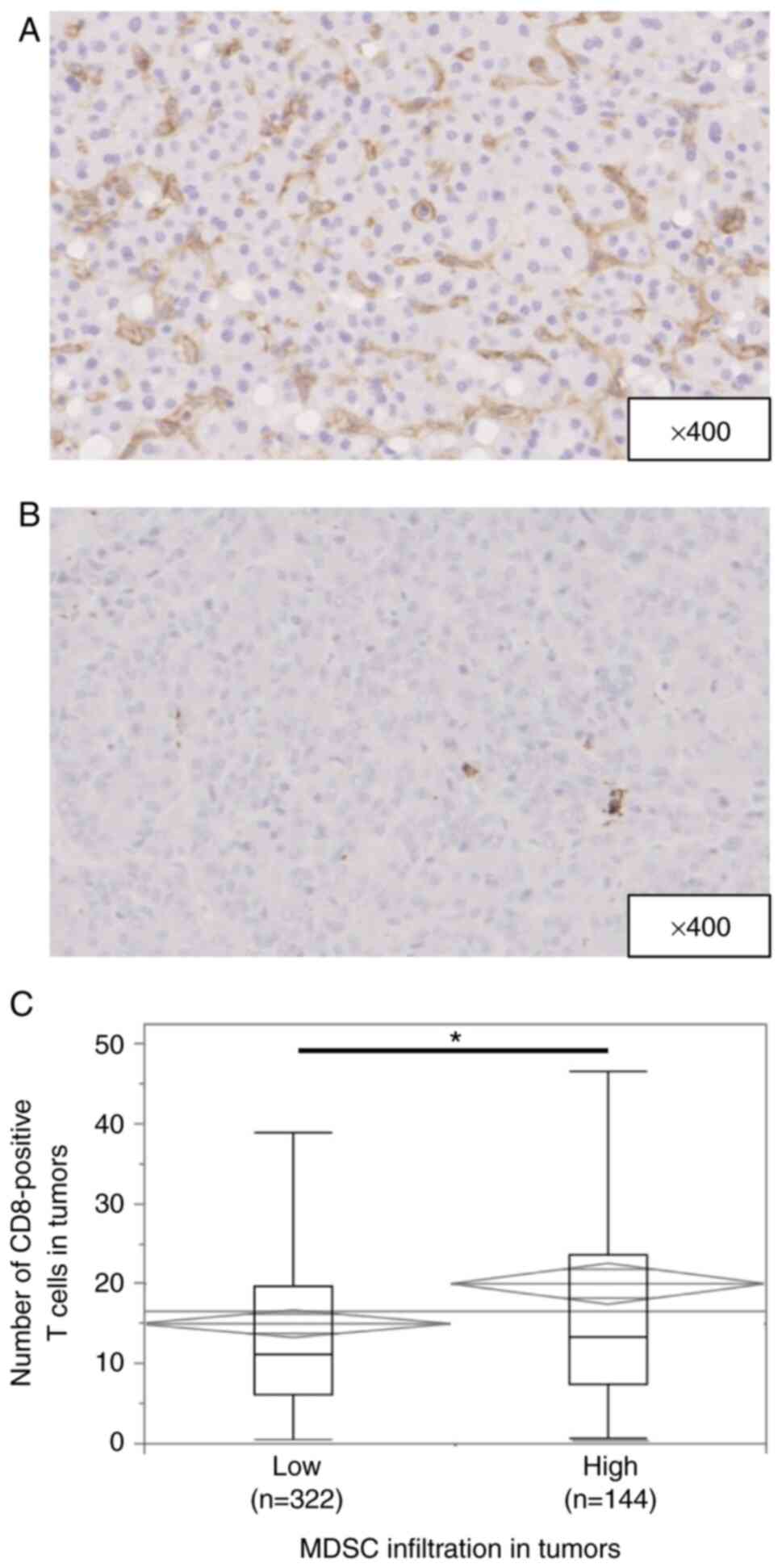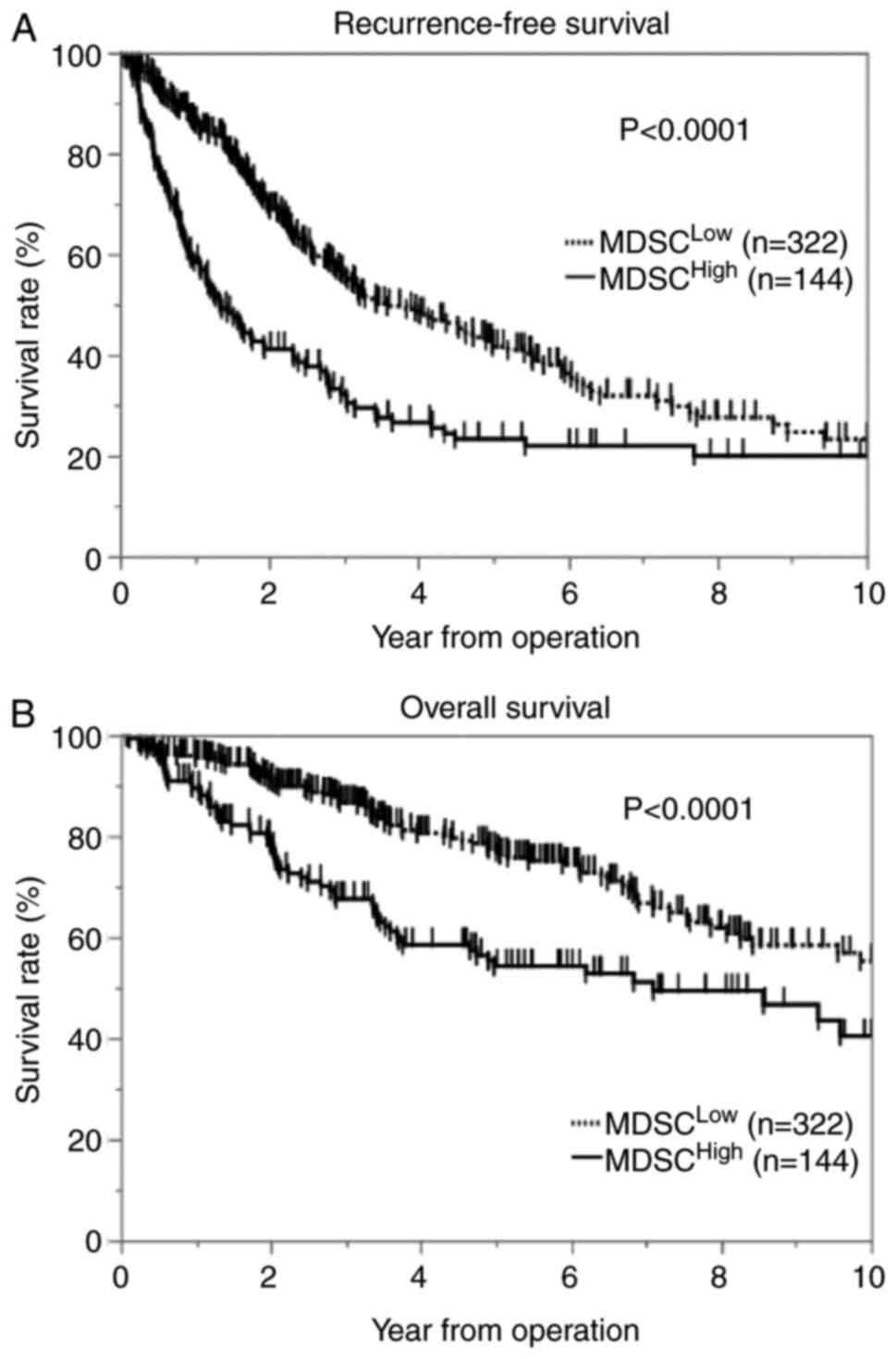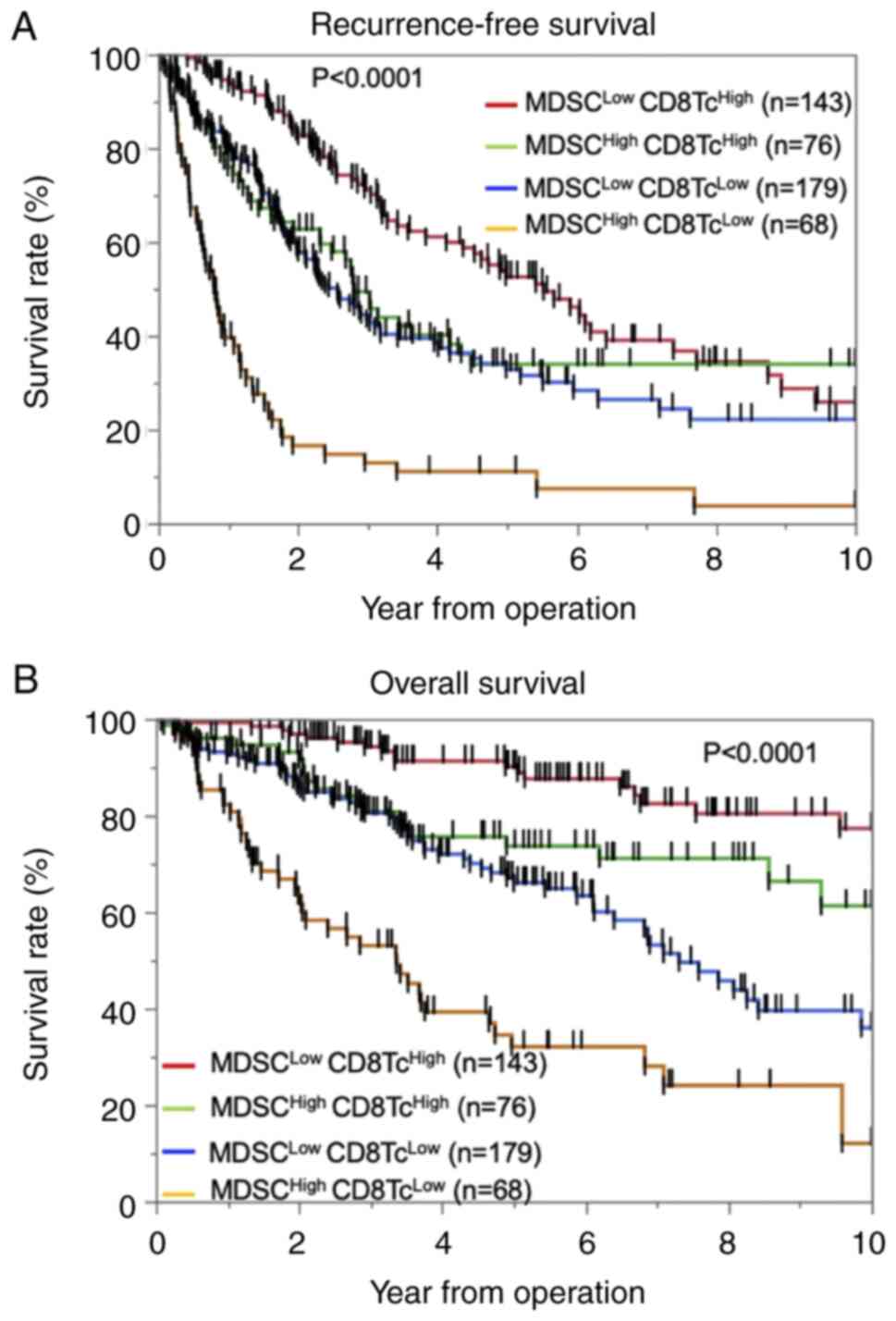|
1
|
Itoh S, Morita K, Ueda S, Sugimachi K,
Yamashita Y, Gion T, Fukuzawa K, Wakasugi K, Taketomi A and Maehara
Y: Long-term results of hepatic resection combined with
intraoperative local ablation therapy for patients with
multinodular hepatocellular carcinomas. Ann Surg Oncol.
16:3299–3307. 2009. View Article : Google Scholar : PubMed/NCBI
|
|
2
|
Itoh S, Shirabe K, Taketomi A, Morita K,
Harimoto N, Tsujita E, Sugimachi K, Yamashita Y, Gion T and Maehara
Y: Zero mortality in more than 300 hepatic resections: Validity of
preoperative volumetric analysis. Surg Today. 42:435–440. 2012.
View Article : Google Scholar : PubMed/NCBI
|
|
3
|
Yagi T, Baba Y, Ishimoto T, Iwatsuki M,
Miyamoto Y, Yoshida N, Watanabe M and Baba H: PD-L1 expression,
tumor-infiltrating lymphocytes, and clinical outcome in patients
with surgically resected esophageal cancer. Ann Surg. 269:471–478.
2019. View Article : Google Scholar : PubMed/NCBI
|
|
4
|
Itoh S, Yoshizumi T, Yugawa K, Imai D,
Yoshiya S, Takeishi K, Toshima T, Harada N, Ikegami T, Soejima Y,
et al: Impact of immune response on outcomes in hepatocellular
carcinoma: association with vascular formation. Hepatology.
72:1987–1999. 2020. View Article : Google Scholar : PubMed/NCBI
|
|
5
|
Unitt E, Marshall A, Gelson W, Rushbrook
SM, Davies S, Vowler SL, Morris LS, Coleman N and Alexander GJ:
Tumour lymphocytic infiltrate and recurrence of hepatocellular
carcinoma following liver transplantation. J Hepatol. 45:246–253.
2006. View Article : Google Scholar : PubMed/NCBI
|
|
6
|
Nishida N: Role of oncogenic pathways on
the cancer immunosuppressive microenvironment and its clinical
implications in hepatocellular carcinoma. Cancers (Basel).
13:36662021. View Article : Google Scholar : PubMed/NCBI
|
|
7
|
Feehan KT and Gilroy DW: Is resolution the
end of inflammation? Trends Mol Med. 25:198–214. 2019. View Article : Google Scholar : PubMed/NCBI
|
|
8
|
Gabrilovich DI and Nagaraj S:
Myeloid-derived suppressor cells as regulators of the immune
system. Nat Rev Immunol. 9:162–174. 2009. View Article : Google Scholar : PubMed/NCBI
|
|
9
|
Marvel D and Gabrilovich DI:
Myeloid-derived suppressor cells in the tumor microenvironment:
Expect the unexpected. J Clin Invest. 125:3356–3364. 2015.
View Article : Google Scholar : PubMed/NCBI
|
|
10
|
Rodríguez PC and Ochoa AC: Arginine
regulation by myeloid derived suppressor cells and tolerance in
cancer: Mechanisms and therapeutic perspectives. Immunol Rev.
222:180–191. 2008. View Article : Google Scholar : PubMed/NCBI
|
|
11
|
Bronte V and Zanovello P: Regulation of
immune responses by L-arginine metabolism. Nat Rev Immunol.
5:641–654. 2005. View
Article : Google Scholar : PubMed/NCBI
|
|
12
|
Tartour E, Pere H, Maillere B, Terme M,
Merillon N, Taieb J, Sandoval F, Quintin-Colonna F, Lacerda K,
Karadimou A, et al: Angiogenesis and immunity: A bidirectional link
potentially relevant for the monitoring of antiangiogenic therapy
and the development of novel therapeutic combination with
immunotherapy. Cancer Metast Rev. 30:83–95. 2011. View Article : Google Scholar : PubMed/NCBI
|
|
13
|
Nefedova Y, Fishman M, Sherman S, Wang X,
Beg AA and Gabrilovich DI: Mechanism of all-trans retinoic acid
effect on tumor-associated myeloid-derived suppressor cells. Cancer
Res. 67:11021–11028. 2007. View Article : Google Scholar : PubMed/NCBI
|
|
14
|
Almand B, Clark JI, Nikitina E, van Beynen
J, English NR, Knight SC, Carbone DP and Gabrilovich DI: Increased
production of immature myeloid cells in cancer patients: A
mechanism of immunosuppression in cancer. J Immunol. 166:678–689.
2001. View Article : Google Scholar : PubMed/NCBI
|
|
15
|
Lathers DMR, Clark JI, Achille NJ and
Young MRI: Phase 1B study to improve immune responses in head and
neck cancer patients using escalating doses of 25-hydroxyvitamin
D3. Cancer Immunol Immunother. 53:422–430. 2004. View Article : Google Scholar : PubMed/NCBI
|
|
16
|
Itoh S, Shirabe K, Matsumoto Y, Yoshiya S,
Muto J, Harimoto N, Yamashita Y, Ikegami T, Yoshizumi T, Nishie A
and Maehara Y: Effect of body composition on outcomes after hepatic
resection for hepatocellular carcinoma. Ann Surg Oncol.
21:3063–3068. 2014. View Article : Google Scholar : PubMed/NCBI
|
|
17
|
Ni H, Zhang L, Huang H, Dai S and Li J:
Connecting METTL3 and intratumoural CD33+ MDSCs in predicting
clinical outcome in cervical cancer. J Transl Med. 18:3932020.
View Article : Google Scholar : PubMed/NCBI
|
|
18
|
Gabrilovich DI, Ostrand-Rosenberg S and
Bronte V: Coordinated regulation of myeloid cells by tumours. Nat
Rev Immunol. 12:253–268. 2012. View Article : Google Scholar : PubMed/NCBI
|
|
19
|
Gao X, Tian L, Wu J, Ma XL, Zhang CY, Zhou
Y, Sun YF, Hu B, Qiu SJ, Zhou J, et al: Circulating
CD14+ HLA-DR−/low myeloid-derived suppressor
cells predicted early recurrence of hepatocellular carcinoma after
surgery. Hepatol Res. 47:1061–1071. 2017. View Article : Google Scholar : PubMed/NCBI
|
|
20
|
Bronte V, Brandau S, Chen SH, Colombo MP,
Frey AB, Greten TF, Mandruzzato S, Murray PJ, Ochoa A,
Ostrand-Rosenberg S, et al: Recommendations for myeloid-derived
suppressor cell nomenclature and characterization standards. Nat
Commun. 7:121502016. View Article : Google Scholar : PubMed/NCBI
|
|
21
|
Sanchez-Pino MD, Dean MJ and Ochoa AC:
Myeloid-derived suppressor cells (MDSC): When good intentions go
awry. Cell Immunol. 362:1043022021. View Article : Google Scholar : PubMed/NCBI
|
|
22
|
Ma J, Zheng B, Goswami S, Meng L, Zhang D,
Cao C, Li T, Zhu F, Ma L, Zhang Z, et al: PD1Hi
CD8+ T cells correlate with exhausted signature and poor
clinical outcome in hepatocellular carcinoma. J Immunother Cancer.
7:3312019. View Article : Google Scholar : PubMed/NCBI
|
|
23
|
Khan O, Giles JR, McDonald S, Manne S,
Ngiow SF, Patel KP, Werner MT, Huang AC, Alexander KA, Wu JE, et
al: TOX transcriptionally and epigenetically programs
CD8+ T cell exhaustion. Nature. 571:211–218. 2019.
View Article : Google Scholar : PubMed/NCBI
|
|
24
|
Zhou J, Liu M, Sun H, Feng Y, Xu L, Chan
AWH, Tong JH, Wong J, Chong CCN, Lai PBS, et al: Hepatoma-intrinsic
CCRK inhibition diminishes myeloid-derived suppressor cell
immunosuppression and enhances immune-checkpoint blockade efficacy.
Gut. 67:9312018. View Article : Google Scholar : PubMed/NCBI
|
|
25
|
Raber PL, Sierra RA, Thevenot PT, Shuzhong
Z, Wyczechowska DD, Kumai T, Celis E and Rodriguez PC: T cells
conditioned with MDSC show an increased anti-tumor activity after
adoptive T cell based immunotherapy. Oncotarget. 7:17565–17578.
2016. View Article : Google Scholar : PubMed/NCBI
|
|
26
|
Davis RJ, Moore EC, Clavijo PE, Friedman
J, Cash H, Chen Z, Silvin C, Van Waes C and Allen C: Anti-PD-L1
efficacy can be enhanced by inhibition of myeloid-derived
suppressor cells with a selective inhibitor of PI3Kδ/γ. Cancer Res.
77:2607–2619. 2017. View Article : Google Scholar : PubMed/NCBI
|
|
27
|
Sharma P and Allison JP: The future of
immune checkpoint therapy. Science. 348:56–61. 2015. View Article : Google Scholar : PubMed/NCBI
|
|
28
|
Zou W, Wolchok JD and Chen L: PD-L1
(B7-H1) and PD-1 pathway blockade for cancer therapy: Mechanisms,
response biomarkers, and combinations. Sci Transl Med.
8:328rv42016. View Article : Google Scholar : PubMed/NCBI
|
|
29
|
Brahmer JR, Tykodi SS, Chow LQ, Hwu WJ,
Topalian SL, Hwu P, Drake CG, Camacho LH, Kauh J, Odunsi K, et al:
Safety and activity of anti-PD-L1 antibody in patients with
advanced cancer. New Engl J Med. 366:2455–2465. 2012. View Article : Google Scholar : PubMed/NCBI
|
|
30
|
Borghaei H, Paz-Ares L, Horn L, Spigel DR,
Steins M, Ready NE, Chow LQ, Vokes EE, Felip E, Holgado E, et al:
Nivolumab versus docetaxel in advanced nonsquamous non-small-cell
lung cancer. New Engl J Med. 373:1627–1639. 2015. View Article : Google Scholar : PubMed/NCBI
|
|
31
|
Kudo M: Immune checkpoint inhibition in
hepatocellular carcinoma: basics and ongoing clinical trials.
Oncology. 92 (Suppl 1):S50–S62. 2017. View Article : Google Scholar
|
|
32
|
Prieto J, Melero I and Sangro B:
Immunological landscape and immunotherapy of hepatocellular
carcinoma. Nat Rev Gastroenterol Hepatol. 12:681–700. 2015.
View Article : Google Scholar : PubMed/NCBI
|
|
33
|
Yugawa K, Itoh S, Yoshizumi T, Iseda N,
Tomiyama T, Morinaga A, Toshima T, Harada N, Kohashi K, Oda Y and
Mori M: CMTM6 stabilizes PD-L1 expression and is a new prognostic
impact factor in hepatocellular carcinoma. Hepatology Commun.
5:334–348. 2021. View Article : Google Scholar : PubMed/NCBI
|
|
34
|
Liu CQ, Xu J, Zhou ZG, Jin LL, Yu XJ, Xiao
G, Lin J, Zhuang SM, Zhang YJ and Zheng L: Expression patterns of
programmed death ligand 1 correlate with different
microenvironments and patient prognosis in hepatocellular
carcinoma. Br J Cancer. 119:80–88. 2018. View Article : Google Scholar : PubMed/NCBI
|
|
35
|
Calderaro J, Rousseau B, Amaddeo G, Mercey
M, Charpy C, Costentin C, Luciani A, Zafrani ES, Laurent A, Azoulay
D, et al: Programmed death ligand 1 expression in hepatocellular
carcinoma: Relationship with clinical and pathological features.
Hepatology. 64:2038–2046. 2016. View Article : Google Scholar : PubMed/NCBI
|
|
36
|
Iseda N, Itoh S, Yoshizumi T, Yugawa K,
Morinaga A, Tomiyama T, Toshima T, Kohashi K, Oda Y and Mori M:
ARID1A deficiency is associated with high programmed death ligand 1
expression in hepatocellular carcinoma. Hepatology Commun.
5:675–688. 2020. View Article : Google Scholar : PubMed/NCBI
|
|
37
|
Gao F and Yang C: Anti-VEGF/VEGFR2
monoclonal antibodies and their combinations with PD-1/PD-L1
inhibitors in clinic. Curr Cancer Drug Targets. 20:3–18. 2020.
View Article : Google Scholar : PubMed/NCBI
|
|
38
|
Kodumudi KN, Woan K, Gilvary DL, Sahakian
E, Wei S and Djeu JY: A novel chemoimmunomodulating property of
docetaxel: suppression of myeloid-derived suppressor cells in tumor
bearers. Clin Cancer Res. 16:4583–4594. 2010. View Article : Google Scholar : PubMed/NCBI
|
|
39
|
Vincent J, Mignot G, Chalmin F, Ladoire S,
Bruchard M, Chevriaux A, Martin F, Apetoh L, Rébé C and
Ghiringhelli F: 5-fluorouracil selectively kills tumor-associated
myeloid-derived suppressor cells resulting in enhanced T
cell-dependent antitumor immunity. Cancer Res. 70:3052–3061. 2010.
View Article : Google Scholar : PubMed/NCBI
|

















